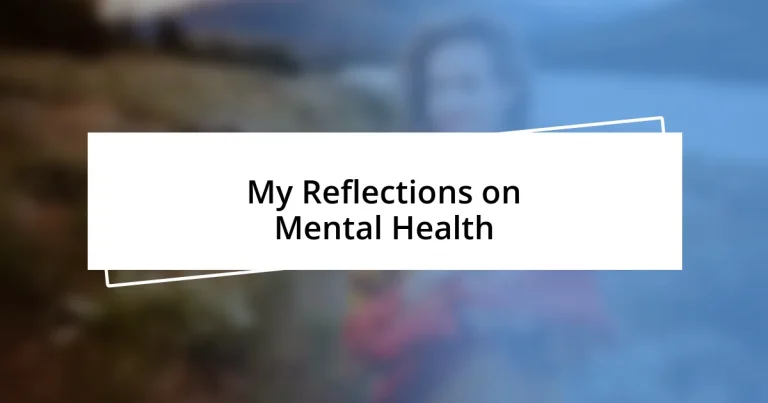Key takeaways:
- The significance of acknowledging and prioritizing mental health can lead to improved resilience and overall well-being.
- Recognizing personal mental health challenges, such as persistent sadness and withdrawal from activities, is an empowering step toward healing.
- Developing coping mechanisms like deep breathing, physical activity, and seeking social support can effectively manage stress.
- Setting specific and flexible goals for mental wellness can facilitate personal growth and emotional clarity.
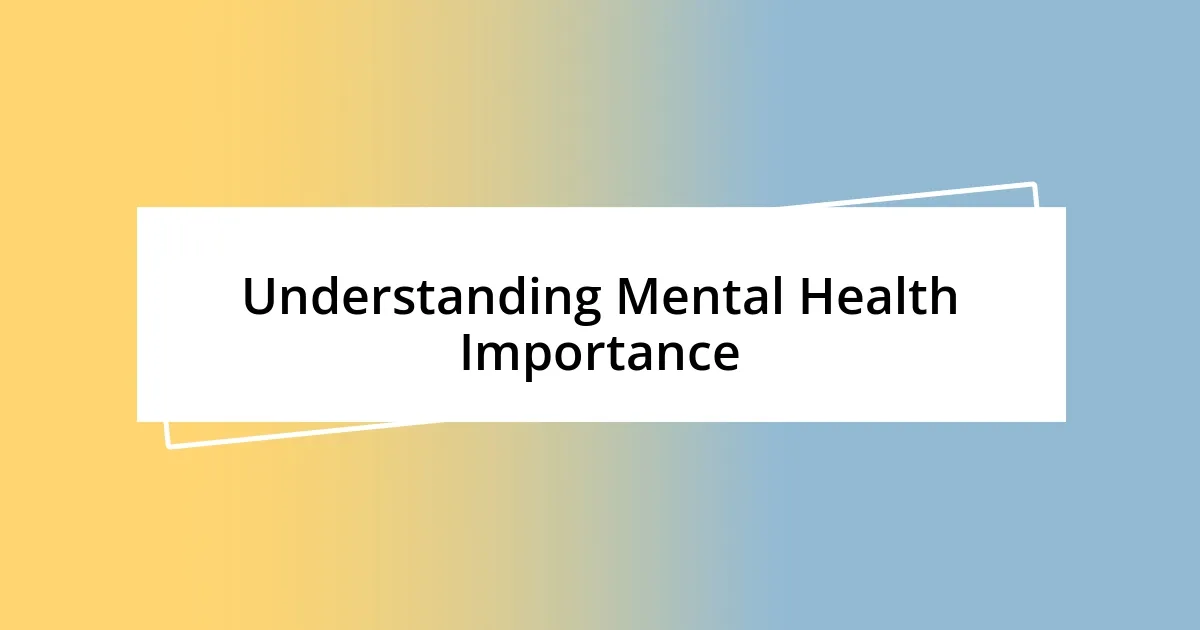
Understanding Mental Health Importance
Understanding the importance of mental health is something I’ve come to appreciate deeply through my own experiences. There were moments in my life when I sidelined my mental well-being, thinking that pushing through was the answer. Reflecting on those times, I can’t help but wonder: How often do we overlook the signs that signal a need for emotional care?
I remember a particularly challenging week when I felt overwhelmed and anxious about an upcoming presentation. Instead of taking a moment to acknowledge those feelings, I buried them under a pile of tasks. That emotional burden eventually manifested into physical fatigue, leaving me questioning why I didn’t prioritize my mental health sooner. It’s a stark reminder that just like our physical health, our mental landscape requires attention and nurturing.
I believe that understanding mental health is crucial because it shapes our interactions, decisions, and overall quality of life. When we prioritize our mental well-being, we create a foundation for resilience. Think about it: how different would our daily experiences be if we approached them with a clear mind and a healthy emotional state? The commitment to understanding this aspect of ourselves can lead to profound shifts in how we navigate life’s challenges.
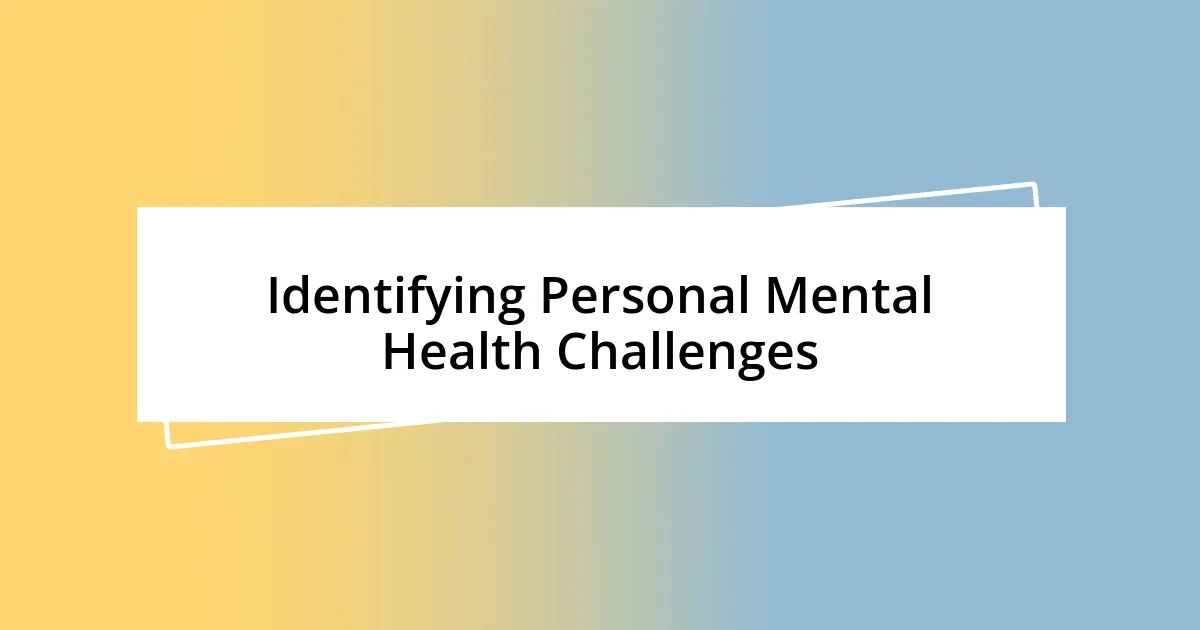
Identifying Personal Mental Health Challenges
Recognizing personal mental health challenges can feel like trying to find a small, hidden treasure in a vast ocean of emotions. I’ve found that often, the first step is listening closely to my feelings, identifying what’s bothering me. For instance, I recall a period when I would wake up with a sense of dread before the day even began. It took time to confront that this wasn’t just anxiety about a busy schedule, but deeper issues that needed my attention.
Here are some signs I’ve learned to look out for when identifying personal mental health challenges:
- Persistent feelings of sadness or hopelessness
- Difficulty concentrating or making decisions
- Changes in sleep patterns, like insomnia or sleeping too much
- Withdrawal from loved ones and activities once enjoyed
- Physical symptoms, such as unexplained aches or a general feeling of fatigue
Through my journey, acknowledging these signs has been crucial. I often remind myself that it’s okay to seek help and that recognizing these challenges is an empowering step toward feeling better.
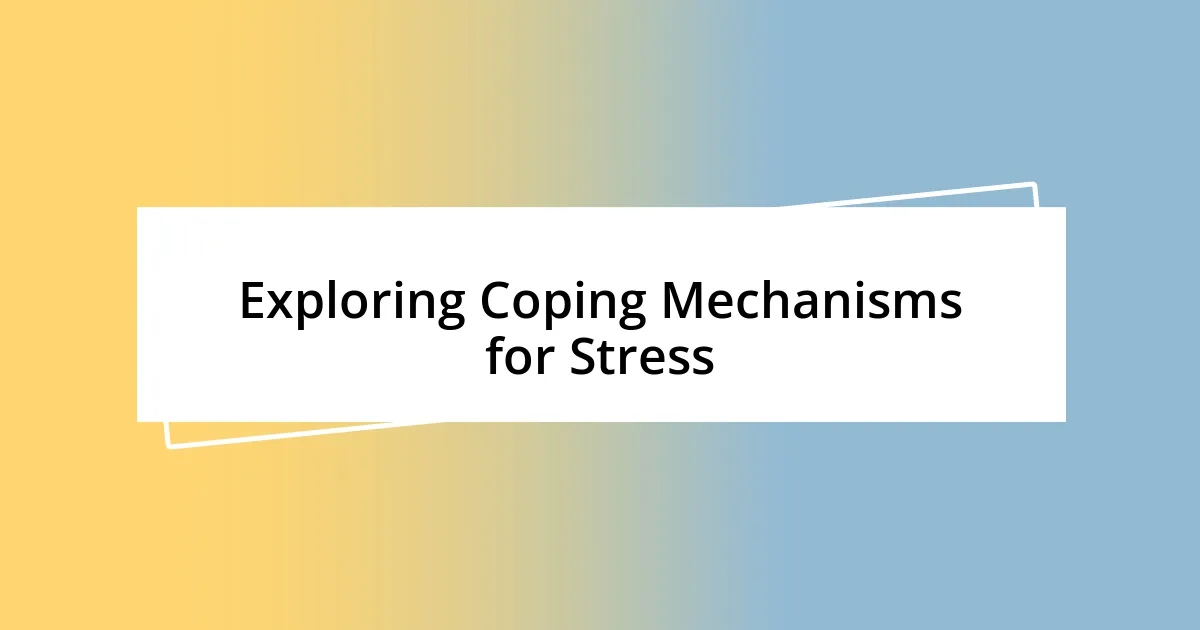
Exploring Coping Mechanisms for Stress
Exploring coping mechanisms for stress can be a game changer in managing our mental health. I’ve discovered that different strategies work for different people, but some universal methods have consistently brought me relief. For instance, when I’m feeling overwhelmed, I often turn to deep-breathing exercises. It’s a simple technique, but taking slow, intentional breaths helps ground me and clears the clutter in my mind.
Another effective method I’ve found is engaging in physical activity. Whether it’s a brisk walk or a spirited dance in my living room, moving my body releases pent-up stress and boosts my mood. I can’t tell you how many times I’ve felt weighed down by stress until just stepping outside for a quick jog made everything feel a bit lighter. This connection between movement and emotional well-being is like a lifeline, something I wish I had recognized sooner in my journey.
Social support has also played a vital role in my coping toolkit. I remember during a particularly tense period at work, I reached out to a friend just to vent. The simple act of sharing what I was going through lifted a tremendous weight off my shoulders. It reminds me that we are not alone in our struggles—sometimes, just talking to someone can provide clarity and fresh perspectives, making the stress feel more manageable.
| Coping Mechanisms | Benefits |
|---|---|
| Deep Breathing | Helps to calm the mind and reduce anxiety. |
| Physical Activity | Releases endorphins, boosting mood and reducing stress. |
| Social Support | Provides emotional relief and new perspectives on challenges. |
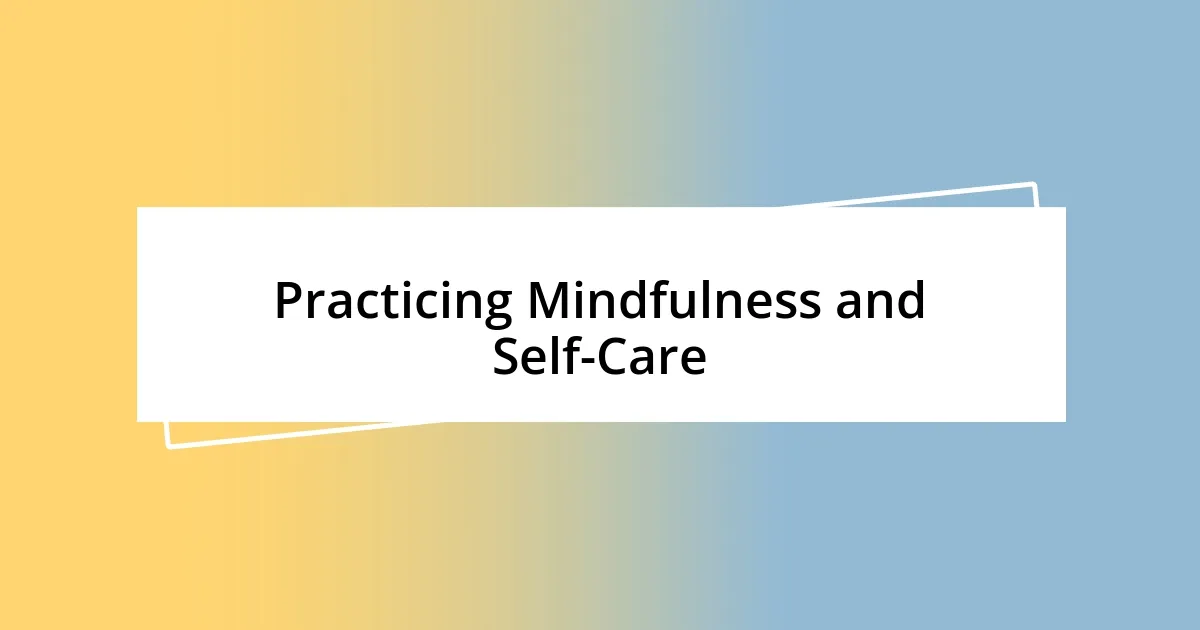
Practicing Mindfulness and Self-Care
Practicing mindfulness has become a cornerstone of my self-care routine. One morning, I decided to start my day with a brief meditation. As I sat quietly, focusing on my breath, I couldn’t help but notice the torrent of thoughts racing through my mind. By acknowledging these thoughts without judgment, I learned to cultivate a space of calm amidst the chaos. Isn’t it fascinating how just a few minutes of stillness can shift our perspective and set a positive tone for the day ahead?
Self-care isn’t just a buzzword for me; it’s a lifeline. I vividly remember a time when I felt completely drained and overwhelmed, and the idea of taking a break felt like an indulgence I didn’t deserve. However, I mustered the courage to schedule regular “me time.” Whether it was curling up with a good book or indulging in a long bubble bath, these little acts of kindness toward myself rejuvenated my spirit. Have you ever noticed how small things can create a ripple effect of positivity in your life?
Moreover, I’ve come to realize that self-care doesn’t always mean treating yourself to something luxurious. It can be as simple as setting boundaries. I recall a phase where I was constantly saying “yes” to every request from friends and family, leaving no time for myself. Once I started saying “no” when I needed to, I found my energy levels increased, and I felt more in control. It’s a reminder that self-care is about making choices that prioritize our well-being, and it’s perfectly okay to put ourselves first sometimes.
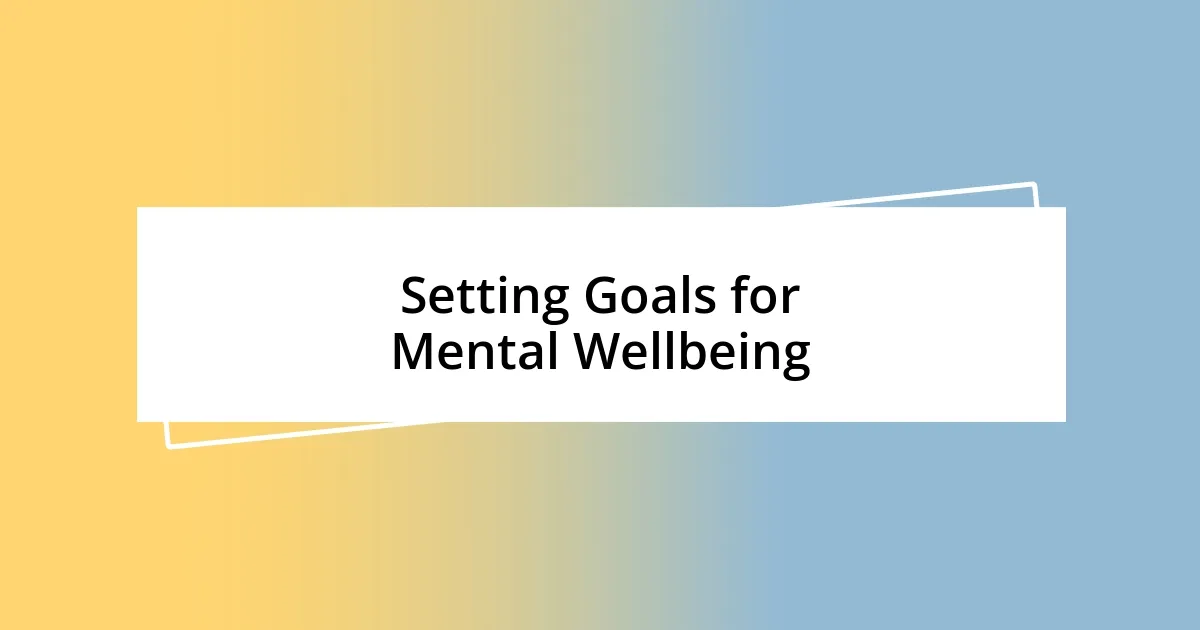
Setting Goals for Mental Wellbeing
Setting goals for mental well-being has been a transformative practice in my life. I remember when I first started. I set a simple goal: to meditate for five minutes daily. Initially, it felt overwhelming, but I slowly adjusted, and now those five minutes have evolved into a cherished ritual. Have you ever considered how small, manageable goals can lead to significant changes over time?
I believe in the power of specificity when setting these goals. Instead of saying, “I want to be happier,” I often frame my goals in concrete terms, like “I will journal three times a week.” This clarity provides a roadmap and makes it easier to track my progress. Each time I scribble down my thoughts, I feel a weight lift, almost like I’m clearing an emotional closet. Have you tried narrowing down your aspirations to make them more tangible?
Additionally, I’ve learned that flexibility is key. There have been weeks where life just doesn’t align with my goals, and that’s okay. I remember a busy period when I missed several journaling sessions. Instead of getting discouraged, I adapted my approach by integrating short reflections into my daily routine. Embracing this flexibility has made my journey feel more personal and less like a strict checklist. How do you stay adaptable in pursuing your own mental wellness goals?
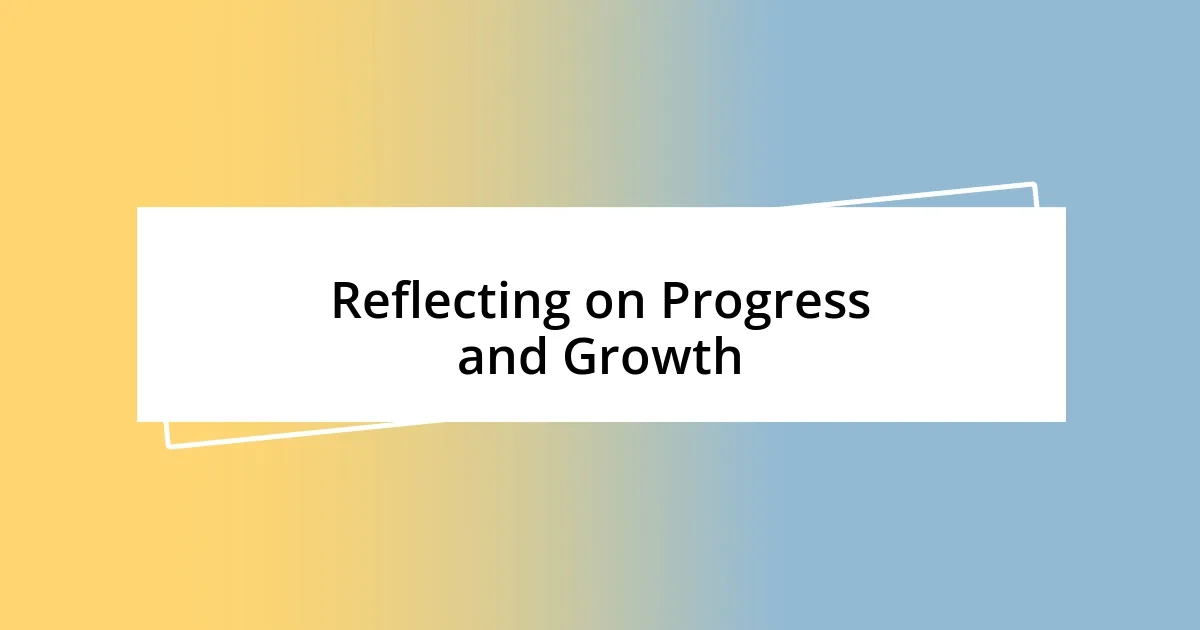
Reflecting on Progress and Growth
Reflecting on my progress in mental health feels like flipping through a personal diary filled with moments of realization. There was a time I struggled deeply with anxiety, often feeling as though I was trapped in a relentless cycle of worry. When I recognized my small victories, like taking a walk outside or reaching out to a friend, it transformed my outlook. Have you ever paused to celebrate your own little triumphs?
Growth isn’t always a straight path; sometimes, it feels more like a winding road full of detours and bumps. I distinctly recall a period when my self-esteem was at an all-time low, and I feared facing challenges head-on. But I learned to view setbacks as opportunities to build resilience. Each stumble taught me something valuable, and I began to appreciate the lessons embedded in my struggles. Isn’t it interesting how our hardest moments can lead to some of our greatest growth spurts?
One of the biggest revelations in my journey has been recognizing that growth is not a solitary endeavor. Sharing my experiences with others has been incredibly empowering. I remember one evening at a support group, where my vulnerability led to a profound connection with someone who shared a similar struggle. It reminded me of the importance of community in this journey—lifting one another up can enhance our paths to well-being. Have you ever considered how being open about your journey could foster connections that lead to shared growth?












